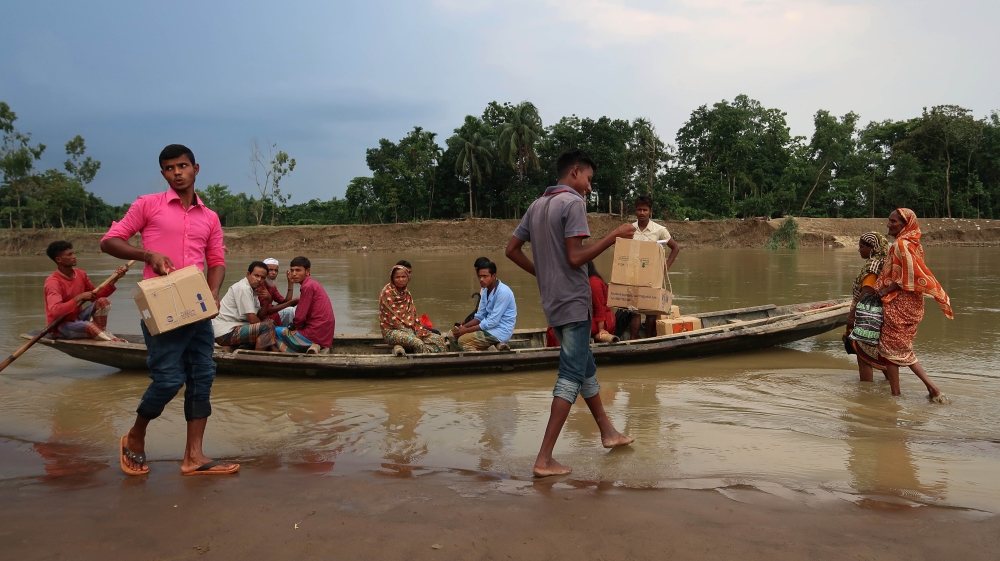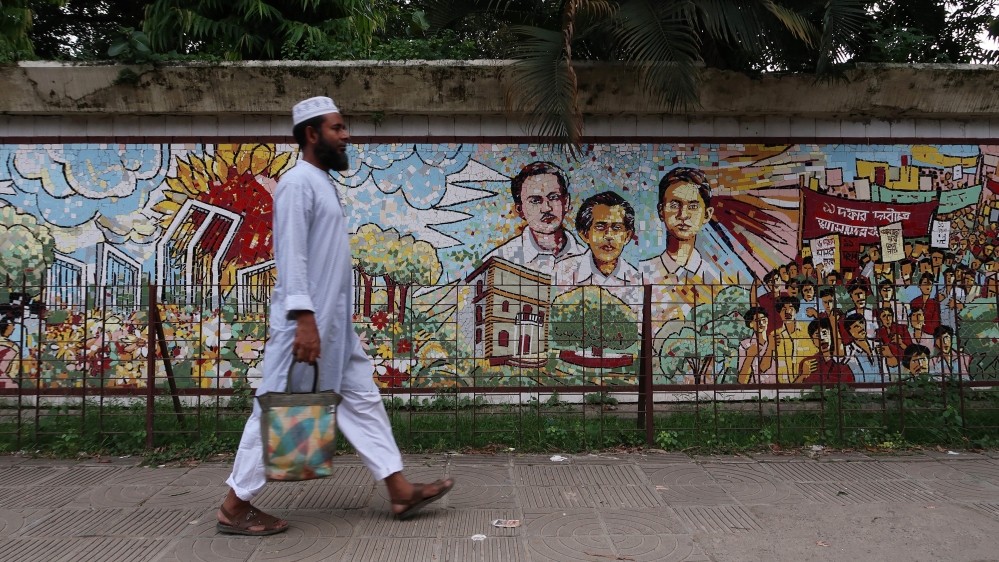Bangladesh’s unsung heroes: Model NGO sector spurs development
In a rural part of Moulvibazar in Bangladesh‘s northeast, a wooden boat crosses the narrow and shallow water, even in the midst of the monsoon.
As it reaches the other side, the passengers get off and start unloading cardboard boxes.
“It’s medicine, 35 boxes in all. I hope it will be enough. We only had two days to collect money this time, and this is what we managed to get,” said Marzia Prova, a university student from Dhaka, as she takes a box and starts walking up from the riverbed.
The others, all young, mostly students, do the same.
It was early morning when they arrived with an overnight bus from the capital to do something Prova has done several times before: set up a makeshift medical camp.
“We came to Moulvibazar today because there was a flood last week, and I heard that families needed help,” says Prova.
They soon approach a small village, where a man unlocks the heavy padlock on a house.
Inside, they set up tables. Two for the doctors and medical students in the group, one for the others to hand out medication.
The grounds outside fill up with people: fathers with their children in hand, elderly men and women. Two young people from the village come to join, and start noting down names on a waitlist.
“We have a lot of enthusiasm in the young generation. That’s why we do this, we want to use it in a good way,” says Jannatul Ferdouse, one of the students from Dhaka.
Volunteer projects like this are not uncommon in Bangladesh, a small and densely populated country.
 |
|
Volunteers unloading boxes of medicine from a small boat crossing the river to get to the village [Jenny Gustafsson/Al Jazeera] |
Bangladesh emerged as an independent nation in 1971, after a war to end the union with Pakistan. A year earlier, the deadliest cyclone on record had hit the region; soon after the war, a devastating famine.
Located right on a large delta, Bangladesh is a prone spot for natural disasters – a challenge for its 160 million people, but also a reason to support one another.
“There is definitely something about the ecology and environment, the history of the country, that has brought about this kind of civil mobilisation,” says David Lewis, a professor at London School of Economics (LSE).
According to Rounaq Jahan, a leading Bangladeshi intellectual, most of the key NGOs are led by people who were involved in the liberation war.
“The war had an impact on people,” he said. “It weakened old social norms, taught people to do things on their own. It unleashed a sense of entrepreneurship.”
Microcredit pioneer Grameen Bank, of Nobel Laureate Muhammad Yunus, is among the humanitarian entrepreneurial organisations – making small loans to the impoverished without requiring collateral.
Development heavyweight BRAC is another. Founded in 1972 by Sir Fazle Hasan Abed, a Shell executive who left his job in London to return and build the post-war capacity of women in his native region of Sylhet, BRAC has become the largest NGO in Bangladesh and the world.
Despite this, Bangladesh’s NGOs are lesser known than their Western counterparts.
“I do think it should be more of an example. But it is not, probably because people don’t know about Bangladesh, and the country finds it difficult to promote itself on a global scale,” said LSE’s Lewis, citing the South Asian country’s humanitarian work towards Rohingya refugees as an example.
From single teaching room to school foundation
Individuals like Prova, the Dhaka university student, have a more limited scope, but do make an impact.
Besides organising support for rural families, Prova also runs a project to set up “emergency pad corners” in schools across the country, with affordable sanitary pads for girls.
With the help of students and friends in different cities, she manages this initiative in schools in eight of Bangladesh’s districts.
“But my plan is to spread them to all 64 districts. Menstrual hygiene is such a taboo in the countryside,” she says.
 |
|
Marzia Prova, a student from Dhaka, runs several social and volunteer projects in Bangladesh, including campaigns to provide medicine in rural areas and give girls access to sanitary pads [Jenny Gustafsson/Al Jazeera] |
In Dhaka’s low-income area of Rayer Bazar, in 2007, student Korvi Rakshand began teaching children of rickshaw drivers, day labourers and domestic workers, who had no access to education, from one single classroom.
The simple classroom turned into a school, and then a foundation, JAAGO, which now runs 12 schools across the country.
“I remember when we asked our first students about their dreams and one of them said, ‘I want to be a rickshaw puller, just like my dad’,” says Rakshand.
“Now, he is in the batch of first graduates from our school, and just started college.”
That child was Lenin Ahmed – 11 years older today.
He has come to the Rayer Bazar school with two other students, Siam Hossain and Sufian Sabbiar. It was Hossain’s father who rented out that first room to Rakshand, and the family still lives on the bottom floor.
“My mother was part of it too, she was the one who talked to people in the community, convincing them of the importance of education. She said, ‘I have three kids, so there are already three students’,” says Hossain.
The school corridor leads to an open courtyard at the back, with trees planted by the children and murals painted on the walls. A new extension building has been built.
“We can see the difference now between us and our old friends who did not get a chance to go to school. They all work as drivers and rickshaw pullers, or hawkers in the street,” says Sabbiar.
Lifesaving aid
Between 20 and 35 percent of the population is estimated to receive services from an NGO, mainly from one of the big actors.
“The government knows that they need us. Tuberculosis vaccine, for instance, could never have been delivered without BRAC, and education could not have been safeguarded. The government knows this,” says Afsan Chowdhury, a journalist and historian who worked with BRAC for several years.
Political mobilisation on the other hand, is less tolerated.
The most recent example is the student-led movement for road safety this summer, triggered by an accident with a speeding bus killing two schoolchildren.
Police and pro-government groups met protesters with violence, and the prolific photographer Shahidul Alam was arrested after commenting on the events in an interview.
 |
|
A man walks past a mosaic in Dhaka depicting the liberation war [Jenny Gustafsson/Al Jazeera] |
Back in Moulvibazar village, the afternoon has turned late and the heat started to diminish. The crowds outside are almost gone, save a few parents and children still waiting for their turn.
Students and doctors at the tables inside have hardly moved an inch since the morning.
“But that’s fine. We are medical students, so this is only a good experience for us,” says Meril Afroz Jebin.
A woman with thin arms and a stubborn cough sits next to her.
Since the flooding, the woman says, the cough refuses to go away.
Jebin writes down cough syrup and nutrition supplements on a note, then sends her to Prova who sits surrounded by empty boxes.
“We only have vitamins for children left now,” Prova says. “So we are giving supplements for kids to the adults too, just telling them to double the dose. For next time, we know that we have to bring more.”




